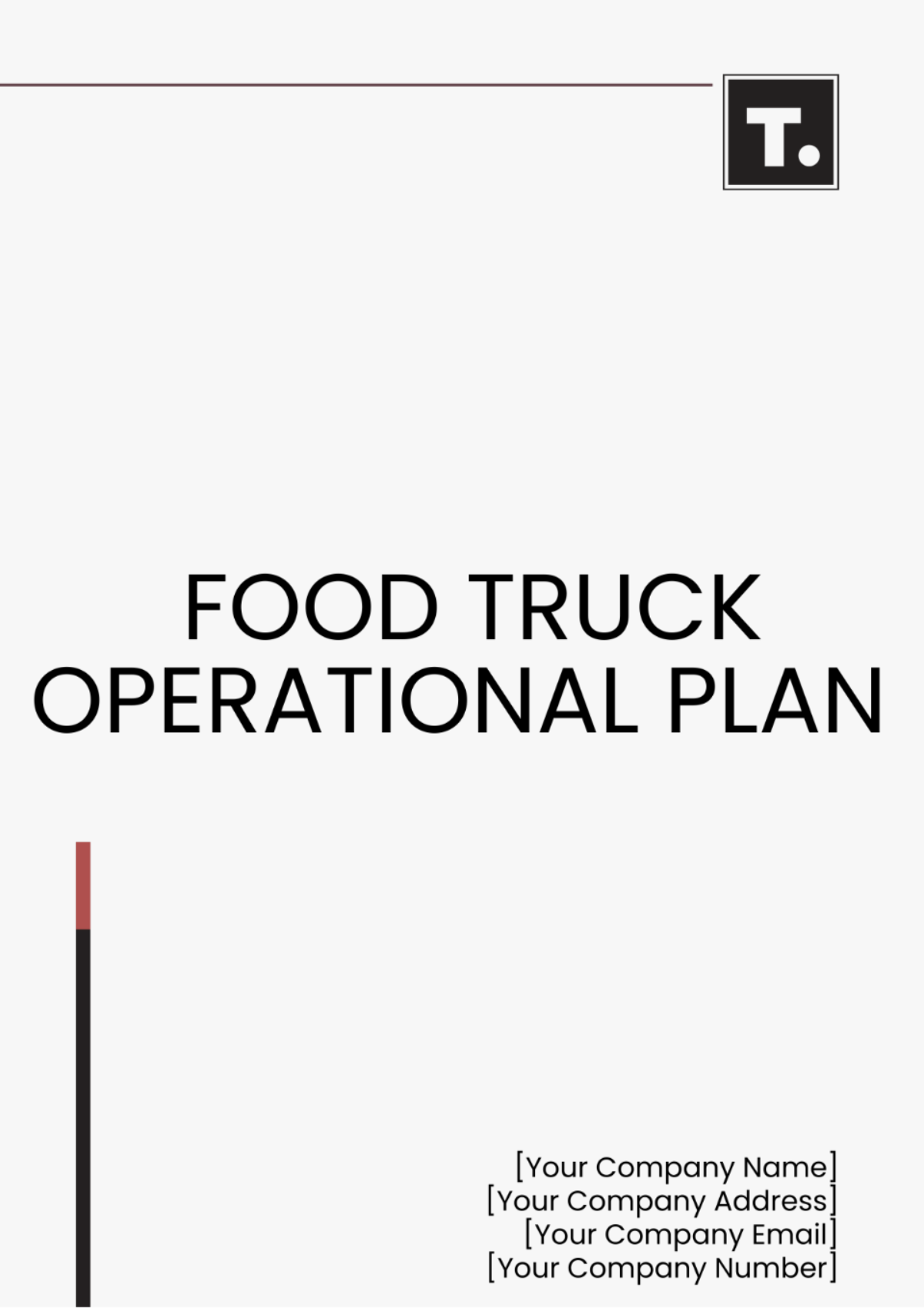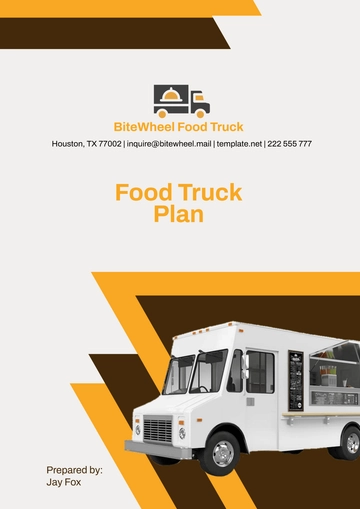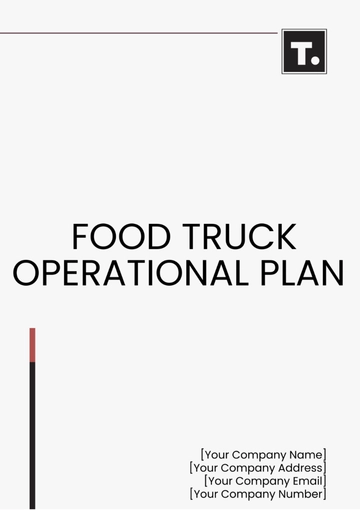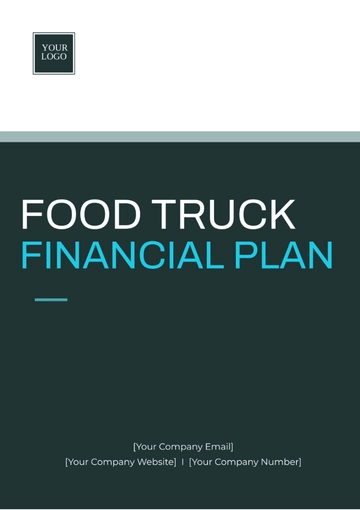Free Food Truck Operational Plan

Prepared by | [Your Name] |
Date | [DATE] |
I. Executive Summary
The purpose of this operational plan is to provide a comprehensive roadmap for the successful launch and operation food truck business. This plan outlines our business goals, market analysis, operational strategy, marketing strategy, and financial projections to ensure all aspects of our business are meticulously planned and executed.
II. Business Goals
Establish a Strong Market Presence: Gain a loyal customer base within the first year of operation.
Achieve Financial Stability: Break-even within the first six months and achieve profitability by the end of the first year.
Expand Operations: Introduce additional food trucks or diversify our menu within three years.
III. Market Analysis
A. Target Market
Our target market includes:
Office workers seeking quick, quality lunch options.
Tourists looking for unique and local culinary experiences.
Event attendees at local festivals, fairs, and community gatherings.
B. Market Trends
Increasing demand for diverse, high-quality, and convenient food options.
Growing popularity of food trucks as a trendy and viable alternative to traditional dining.
Consumer preference for locally sourced and organic ingredients.
C. Competitor Analysis
Our competitors include local restaurants, other food trucks, and fast-food chains. We will differentiate ourselves through unique menu offerings, superior customer service, and strategic location choices.
IV. Operational Strategy
A. Location and Schedule
Primary Locations: The downtown business district, popular tourist spots, and local event venues.
Operational Hours: Monday to Friday (11 AM - 3 PM) for lunch services, with extended hours during special events and weekends.
B. Menu and Sourcing
Menu Offerings: A diverse selection of gourmet sandwiches, salads, and desserts with vegan and gluten-free options.
Sourcing: Partnering with local farms and suppliers to ensure fresh and high-quality ingredients.
C. Equipment and Maintenance
Food Truck: A fully equipped truck with necessary kitchen appliances, storage, and serving areas.
Maintenance Schedule: Regular maintenance checks and adherence to health and safety standards.
D. Staffing
Staff Requirements: A team consisting of a head chef, two assistant chefs, and a cashier.
Training: Comprehensive training in food preparation, safety standards, and customer service.
V. Marketing Strategy
A. Branding
Brand Identity: A memorable name, logo, and color scheme that reflects our commitment to quality and innovation.
Brand Story: Communicating our passion for culinary excellence and commitment to sustainability.
B. Promotion
Social Media: Active presence on platforms like Instagram, Facebook, and Twitter to engage with customers and share updates.
Local Advertising: Flyers, posters, and ads in local newspapers and magazines.
Special Events: Participation in local festivals, fairs, and community events to increase visibility.
C. Customer Engagement
Loyalty Programs: Offering discounts and rewards for repeat customers.
Feedback Mechanisms: Encouraging customer feedback to continuously improve our offerings and service.
VI. Financial Projections
A. Startup Costs
Startup Cost Item | Cost ($) |
|---|---|
Food Truck Purchase and Customization | 80,000 |
Initial Inventory and Supplies | 10,000 |
Licenses and Permits | 5,000 |
Marketing and Branding | 5,000 |
Miscellaneous Expenses | 5,000 |
Total Startup Costs | 105,000 |
B. Revenue Projections
Monthly Revenue: $20,000 (conservative estimate based on average daily sales)
Annual Revenue: $240,000
C. Expense Projections
Expense Item | Monthly Cost ($) | Annual Cost ($) |
|---|---|---|
Salaries | 7,000 | 84,000 |
Inventory | 5,000 | 60,000 |
Maintenance | 1,000 | 12,000 |
Utilities | 500 | 6,000 |
Miscellaneous | 1,500 | 18,000 |
Total Operating Costs | 15,000 | 180,000 |
D. Profit Projections
Financial Metric | Amount ($) |
|---|---|
Annual Revenue | 240,000 |
Annual Operating Costs | 180,000 |
Annual Profit | 60,000 |
VII. Risk Management
A. Potential Risks
Weather Dependence: Adverse weather conditions affecting sales.
Regulatory Changes: Changes in local regulations impacting operations.
Equipment Failure: Breakdowns affecting service delivery.
B. Mitigation Strategies
Weather: Establishing indoor partnerships for bad weather days.
Regulations: Staying informed and compliant with all local regulations.
Equipment: Regular maintenance and having contingency plans for equipment failure.
VIII. Conclusion
This strategy document details our method for initiating and managing a prosperous food truck venture, emphasizing excellence, consumer contentment, and planned expansion, ensuring our confidence in attaining business objectives and securing a robust position in the market.
- 100% Customizable, free editor
- Access 1 Million+ Templates, photo’s & graphics
- Download or share as a template
- Click and replace photos, graphics, text, backgrounds
- Resize, crop, AI write & more
- Access advanced editor
Boost your food truck business with the Food Truck Operational Plan Template from Template.net. This fully customizable and editable template ensures efficient operations. Seamlessly tailored to your needs, it's editable in our Ai Editor Tool, allowing you to create a professional and organized plan effortlessly. Streamline your food truck journey today with Template.net!
You may also like
- Finance Plan
- Construction Plan
- Sales Plan
- Development Plan
- Career Plan
- Budget Plan
- HR Plan
- Education Plan
- Transition Plan
- Work Plan
- Training Plan
- Communication Plan
- Operation Plan
- Health And Safety Plan
- Strategy Plan
- Professional Development Plan
- Advertising Plan
- Risk Management Plan
- Restaurant Plan
- School Plan
- Nursing Home Patient Care Plan
- Nursing Care Plan
- Plan Event
- Startup Plan
- Social Media Plan
- Staffing Plan
- Annual Plan
- Content Plan
- Payment Plan
- Implementation Plan
- Hotel Plan
- Workout Plan
- Accounting Plan
- Campaign Plan
- Essay Plan
- 30 60 90 Day Plan
- Research Plan
- Recruitment Plan
- 90 Day Plan
- Quarterly Plan
- Emergency Plan
- 5 Year Plan
- Gym Plan
- Personal Plan
- IT and Software Plan
- Treatment Plan
- Real Estate Plan
- Law Firm Plan
- Healthcare Plan
- Improvement Plan
- Media Plan
- 5 Year Business Plan
- Learning Plan
- Marketing Campaign Plan
- Travel Agency Plan
- Cleaning Services Plan
- Interior Design Plan
- Performance Plan
- PR Plan
- Birth Plan
- Life Plan
- SEO Plan
- Disaster Recovery Plan
- Continuity Plan
- Launch Plan
- Legal Plan
- Behavior Plan
- Performance Improvement Plan
- Salon Plan
- Security Plan
- Security Management Plan
- Employee Development Plan
- Quality Plan
- Service Improvement Plan
- Growth Plan
- Incident Response Plan
- Basketball Plan
- Emergency Action Plan
- Product Launch Plan
- Spa Plan
- Employee Training Plan
- Data Analysis Plan
- Employee Action Plan
- Territory Plan
- Audit Plan
- Classroom Plan
- Activity Plan
- Parenting Plan
- Care Plan
- Project Execution Plan
- Exercise Plan
- Internship Plan
- Software Development Plan
- Continuous Improvement Plan
- Leave Plan
- 90 Day Sales Plan
- Advertising Agency Plan
- Employee Transition Plan
- Smart Action Plan
- Workplace Safety Plan
- Behavior Change Plan
- Contingency Plan
- Continuity of Operations Plan
- Health Plan
- Quality Control Plan
- Self Plan
- Sports Development Plan
- Change Management Plan
- Ecommerce Plan
- Personal Financial Plan
- Process Improvement Plan
- 30-60-90 Day Sales Plan
- Crisis Management Plan
- Engagement Plan
- Execution Plan
- Pandemic Plan
- Quality Assurance Plan
- Service Continuity Plan
- Agile Project Plan
- Fundraising Plan
- Job Transition Plan
- Asset Maintenance Plan
- Maintenance Plan
- Software Test Plan
- Staff Training and Development Plan
- 3 Year Plan
- Brand Activation Plan
- Release Plan
- Resource Plan
- Risk Mitigation Plan
- Teacher Plan
- 30 60 90 Day Plan for New Manager
- Food Safety Plan
- Food Truck Plan
- Hiring Plan
- Quality Management Plan
- Wellness Plan
- Behavior Intervention Plan
- Bonus Plan
- Investment Plan
- Maternity Leave Plan
- Pandemic Response Plan
- Succession Planning
- Coaching Plan
- Configuration Management Plan
- Remote Work Plan
- Self Care Plan
- Teaching Plan
- 100-Day Plan
- HACCP Plan
- Student Plan
- Sustainability Plan
- 30 60 90 Day Plan for Interview
- Access Plan
- Site Specific Safety Plan



